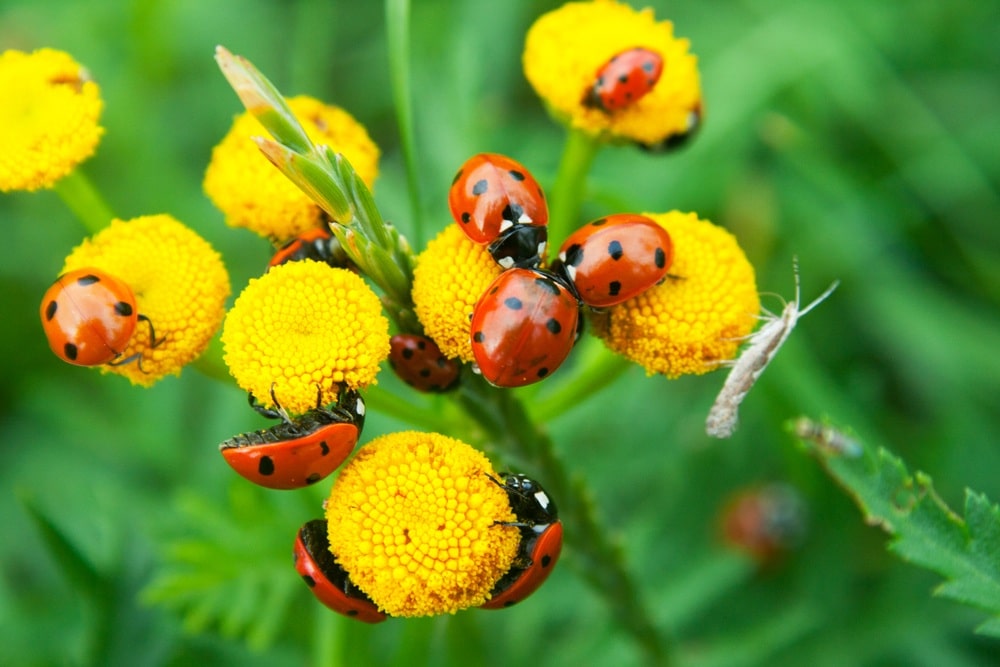When it comes to gardening, many people focus solely on the plants they want to grow and overlook the importance of beneficial insects. These tiny creatures can play a vital role in maintaining a healthy garden ecosystem by controlling pests, pollinating flowers, and improving soil quality. Incorporating companion planting techniques that attract beneficial insects is not only environmentally friendly but also reduces the need for harmful pesticides. In this article, we will explore some common beneficial insects and how you can attract them to your garden through companion planting.
One of the most well-known beneficial insects is the ladybug. Ladybugs are voracious predators of aphids, mites, scale insects, and other destructive pests that can damage your plants. To invite these colorful beetles into your garden, consider adding plants such as dill, fennel, yarrow, or marigolds. These flowering herbs act as a magnet for ladybugs due to their pollen and nectar-rich blooms.
Another helpful insect in pest control is the lacewing. Lacewings feed on soft-bodied pests like aphids, thrips, and caterpillars while also playing a crucial role in pollination. By including plants such as daisies or cosmos in your garden bed or bordering rows of vegetables with these flowers, you create an inviting habitat for lacewings.
Hoverflies are often mistaken for bees due to their similar appearance but lack stingers. They are excellent pollinators and consume large quantities of aphids during their larval stage. Hoverflies are attracted to flowers with shallow nectaries like asters or sunflowers where they can easily access nectar while laying eggs near potential prey sites.
Parasitic wasps may sound intimidating; however, they are harmless to humans but deadly adversaries against many garden pests such as caterpillars and grubs. Parasitic wasps lay their eggs inside host insects who then become food for developing wasp larvae when they hatch. To attract these beneficial wasps, include plants like dill, parsley, or Queen Anne’s lace in your garden.
If you’re facing a slug problem in your garden, consider inviting the ground beetle to the rescue. Ground beetles are nocturnal predators that feast on slugs and other small pests that emerge at night. You can provide them with a comfortable home by adding low-growing plants such as alfalfa or perennial peanut around your garden beds.
In addition to pest control, some beneficial insects contribute to soil health and fertility. Earthworms are nature’s tillers; their burrowing activities help aerate the soil while their castings enrich it with valuable nutrients. By incorporating cover crops like clover or vetch into your rotation plan, you create an attractive environment for earthworms and improve overall soil structure.
Bumblebees are known for their important role in pollination but also play a part in increasing fruit set by shaking pollen loose from flowers through buzzing vibrations. They prefer flowers with tubular shapes such as foxgloves or bee balm which provide easy access to nectar-rich rewards.
Mason bees are solitary bees that do not produce honey but are exceptional pollinators due to their efficiency and large numbers during peak flowering seasons. These bees require nesting sites where they lay eggs inside hollow stems or wood tunnels. By providing nesting boxes made of bamboo tubes or drilling holes into blocks of untreated wood, you can encourage mason bee populations in your garden.
To maximize the benefits of companion planting for beneficial insects, it is essential to diversify plant species within your garden space. Different insects have specific preferences when it comes to food sources and shelter; therefore, a variety of plant options will cater to a broader range of beneficial insect species.
It is worth noting that using chemical pesticides can harm both harmful and helpful insects alike. Instead of resorting to such measures at the first sign of trouble, consider introducing natural pest control methods, like companion planting. By attracting beneficial insects to your garden, you create a balanced ecosystem that reduces the need for harmful chemicals and promotes a healthy and thriving environment for both plants and insects.
In conclusion, incorporating companion planting techniques to attract beneficial insects can significantly improve your garden’s overall health and productivity. Ladybugs, lacewings, hoverflies, parasitic wasps, ground beetles, earthworms, bumblebees, and mason bees are just a few of the many beneficial insects that can be attracted through proper plant selection. By providing them with food sources and habitat diversity through diverse plantings in your garden space, you create an environment where these helpful creatures thrive while assisting you in controlling pests naturally. So next time you plan your garden layout or decide which flowers to include in your beds or borders, remember the unsung heroes – the beneficial insects – who will work alongside you to maintain a flourishing garden paradise.


Leave a comment